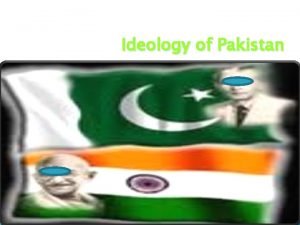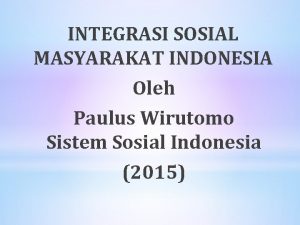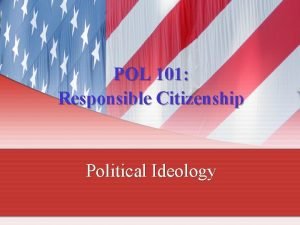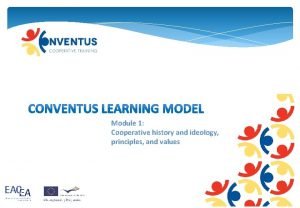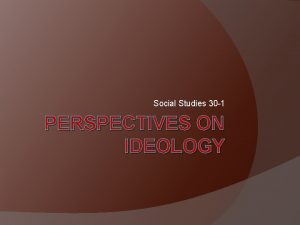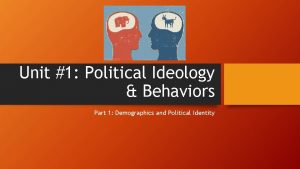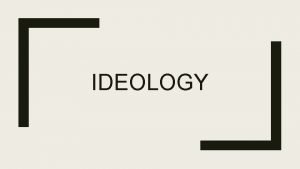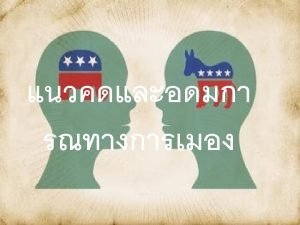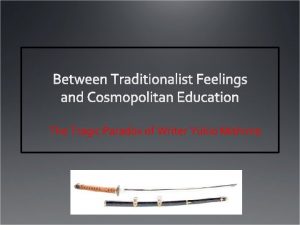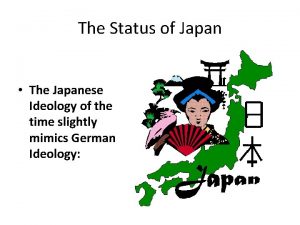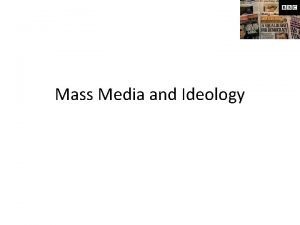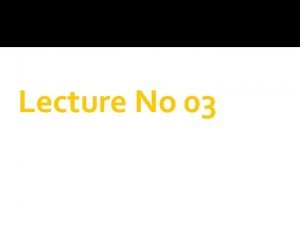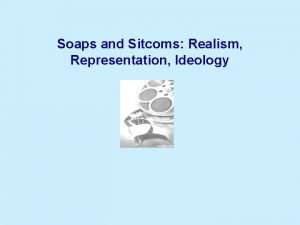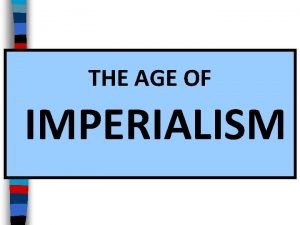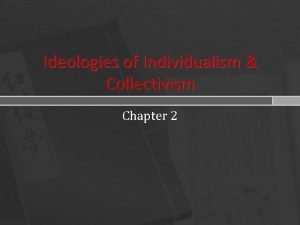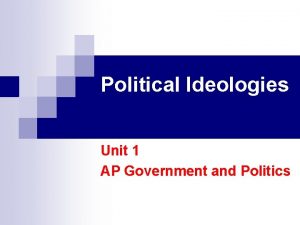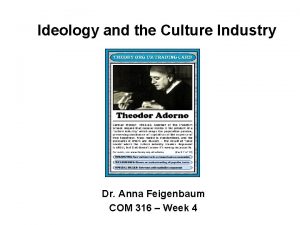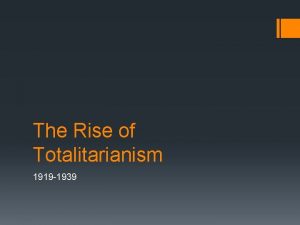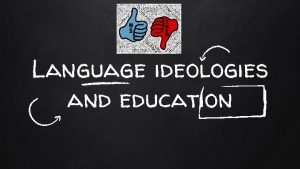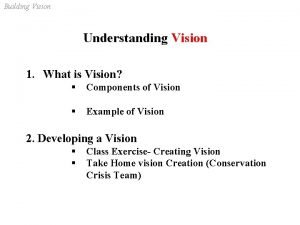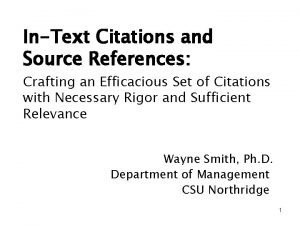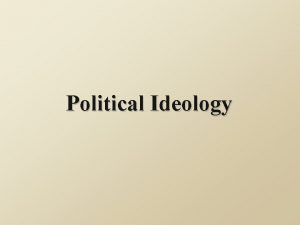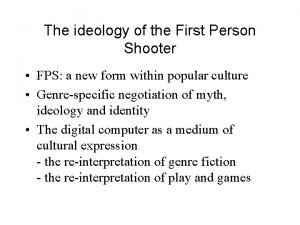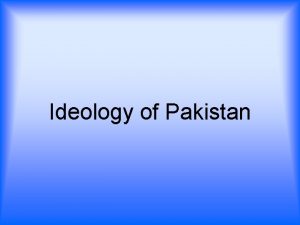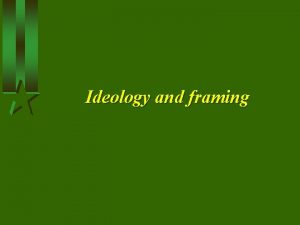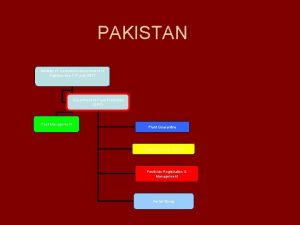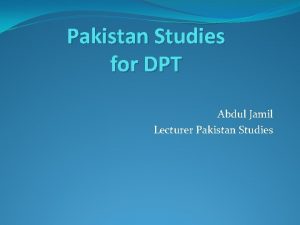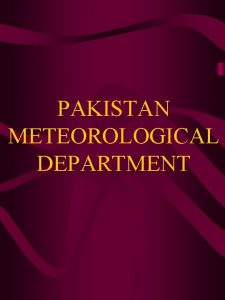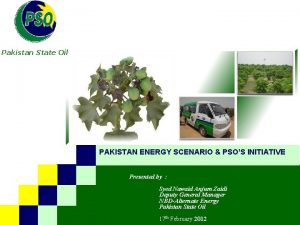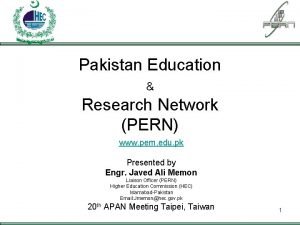Ideology of Pakistan What is ideology Ideology is






























- Slides: 30

Ideology of Pakistan

What is ideology Ideology is a French word. Here's what Webster's dictionary gives us for ideology: 1 : visionary theorizing 2 a systematic body of concepts especially about life or culture 3 : the integrated assertions, theories, and aims that constitute a sociopolitical program

Components of ideology 1. Common Religion 2. Common Culture 3. Common Causes 4. Sincere Dedication and Pledges

Importance of Ideology l It is not only a thought but it is also a feeling which awakens humans to progress l To move forward & to fulfilments of desires l It sets the mutual duties & rights of the humans

Definition: Nation A nation is a territory or country as political entity or a grouping of people who share real or imagined common history, culture, language or ethnic origin, often possessing or seeking its own government. (Wikipedia)

Two Nation Theory The phenomenon of Two-Nation theory originated with the advent of Islam in the Sub-Continent (712 AD). Quaid-e-Azam once said: “Pakistan was created the day the first Indian national entered the field of Islam. "

Ideology of Pakistan • • • As in the beginning of the 11 th century, Al-Biruni observed that Hindus differed from the Muslims in all matters and habits. He further elaborated his argument by writing that the Hindus considered Muslims "Mlachha", or impure. And they forbid having any connection with them, be it intermarriage or any other bond of relationship. They even avoid sitting, eating and drinking with them, because they feel "polluted".

Two Nation Theory Mahatma Gandhi, speaking in the second session of the Round table conference in London in 1931, said : “quarrel between Hindus and Muslims was ‘core view with the British advent’ in India. It would be difficult to maintain such a position historically because the conflict between Hindus and Muslims had started long before the emergence of the British power in India. ”

Two Nation Theory. In an interview, the founder of Pakistan Muhammad Ali Jinnah said in 1944 “You must remember that Islam is not merely a religious doctrine(policy) but a realistic and practical code of conduct. I am thinking in terms of everything important in life. I am thinking in terms of our history, our heroes, our art, our architecture, our laws, our jurisprudence”.

Factors Creating the Idea of Separate Homeland ◦ ◦ ◦ ◦ Religious Differences Hindu Nationalism Cultural Differences Social Differences Economic Differences Educational Differences Political Differences

Religious Differences. Muslims: The religion of Muslims is Islam preaches Tawheed (oneness of Allah) , namaz , roza(keeping fast) , zakat, hajj, and believes in equality of man before law. Muslims are the believers of God, The Holy Prophet (P. B. U. H) the Holy Book Quran and hold a cohesive(organized) approach towards life.

Religious Differences. Hindus: Hindus believe in Hinduism is based on the concept of multiple Gods. Their society follows a caste system and is divided into four classes and have a very narrow approach towards life.

Cultural Differences Muslim followed the Islamic culture while Hindus inherited a self build culture. The Hindus burnt their dead bodies while Muslims burried them. Hindus considered the 'Mother cow' as a sacred(holy) animal and worshiped it while Muslims slaughtered it.

Social Differences The two communities of the Sub Continent differ in their social life as well. The clothes, the foods, the household utensils, the layout of homes, the words of salutation(salam) etc…

Hindi Urdu Controversy (disagreemment) In 1867, Hindus demanded that Urdu should be written in Hindi Script instead of Persian script. This created another gap between Hindus and Muslims.

What do you think? ? I think they need different boats.

Quaid-e. Azam Molana Ashraf Ali Thanvi Pakistan Sir Syed Ahmad Khan Allama Iqbal

Molana Ashraf Ali Thanvi & Ideology of Pakistan First Muslim leader who presented the idea of ‘Two Nation Theory’ in 1928. Wrote more than 1300 books. He was the murshid of Shabbir Ahmad Usmani and Mufti Muhammad Shafi who supported Pakistan movement His two students— Maulana Shabbir Ahmed Usmani and Maulana Zafar Ahmed Usmani — were given the honour of unfurling( )ﻟہﺮﺍﻧہ the national flag in Karachi and Dacca Company Logo

Sir Syed & Ideology of Pakistan Sir Syed Ahmed Khan first used the word ‘Two Nations’ for Hindus and Muslims. After Hindi-Urdu controversy Sir Syed felt that it was not possible for Hindus and Muslims to progress as a single nation. He said: " I am convinced(sure) now that Hindus and Muslims could never become one nation as their religion and way of life was quite distinct(different) from each other. "

Quaid e Azam and Ideology of Pakistan On March 22, 1940 in his presidential address to the All-India Muslim League Lahore session, the founder of Pakistan M A Jinnah made it plain() that “The Hindus and the Muslims belong to two different religious philosophies, social customs, and literature. They neither intermarry, nor interdine together, and indeed they belong to two different civilizations which are based mainly on conflicting ideas and conceptions. He further said , Musalmans are a nation according to any definition of a nation, and they must have their homeland, their territory(country) and their State “

The Quaid-e-Azam & Ideology of Pakistan Formation of Islamic democracy (������� ) Said on August 14, 1947 at a press conference: “In reality we had learnt democracy 1300 years ago. So when you talk about democracy, I doubt that you have not studied Islam”

The Quaid-i-Azam & Ideology of Pakistan Opposition of Racism & prejudices In Dhaka on March 21, 1948 he said, “You do not talk in term of Bengali, Sindhi, Balochi or Pathan rather you remember the lesson of 1300 years ago that we are not Sindhi, Balochi or Pathan but we are Muslims and only Muslims”

The Quaid-i-Azam & Ideology of Pakistan No need of any “ISM“except Islam In March 1944, while addressing the students, Quaid said, “Islam is our guide and a complete code of life. We neither need any red or yellow flag nor we need any socialism, communism, Nationalism or any other ism” Need of testing the Islamic Education Addressing to the students of Islamia College of Peshawar on January 13, 1948, said, “We demanded Pakistan not for a piece of land but we wanted such a laboratory where Islamic principles could be tested”

Allama Iqbal & Ideology of Pakistan ö ö Allama Iqbal never used the word Pakistan in his speeches but in all his speeches he demanded separate homeland for the Muslims of the subcontinent. His sayings are considered as the ideology of Pakistan

Allama Iqbal & Ideology of Pakistan Islam is complete code of life Annual meeting of Muslim league on December 29, 1930 at Allahabad, he said: “Islam is not the name some beliefs and customs but it is a complete code of life. In, Europe, religion is very one’s personal matter which divides the human oneness into two opposite parts i. e. body and soul. In contrast to that in Islam, God, Universe, Soul, Matter, State and Religious places are bound to each other or in other words Muslims are one nation. ”

Allama Iqbal & Ideology of Pakistan Islam is the way to success “The lesson which I learnt from history is that Islam always helped the Muslims at the time of difficulty but Muslims did not save Islam. Even today, Ideology of Islam can save you from destruction by uniting your divided powers”

Allama Iqbal & Ideology of Pakistan

Ideology of Pakistan & importance of two nation theory Pakistan appeared on the world map in August 1947, and became the first Islamic ideological state of the modern times. Unlike the non-ideological states, it was not established due to any geographical conflict or territorial domination by a group of people.

Company Logo

Company Logo
 Sir syed ahmed khan ideology of pakistan
Sir syed ahmed khan ideology of pakistan Whats political ideology
Whats political ideology Jelaskan pengertian integrasi sosial
Jelaskan pengertian integrasi sosial Collectivism ideology
Collectivism ideology What is ideology
What is ideology Political ideology definition ap gov
Political ideology definition ap gov Cooperative ideology
Cooperative ideology Perspectives on ideology
Perspectives on ideology Great musthaves
Great musthaves Political ideology
Political ideology Ideology definition
Ideology definition Money ideology compromise ego
Money ideology compromise ego Sistemas democraticos
Sistemas democraticos Yukio mishima ideology
Yukio mishima ideology Japanese ideology
Japanese ideology Ideology meaning
Ideology meaning Significance of ideology
Significance of ideology Ideology
Ideology Sources of ideology
Sources of ideology Political ideology definition
Political ideology definition Imperialism
Imperialism Ideology of individualism
Ideology of individualism Political ideology
Political ideology Horkeimer
Horkeimer Ideology examples
Ideology examples Hitler ideology
Hitler ideology Language brazil
Language brazil What is vision
What is vision Difference between theory and ideology
Difference between theory and ideology Political ideology definition
Political ideology definition First person shooter ideology
First person shooter ideology
